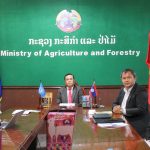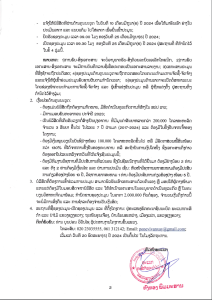ການລິເລີ່ມຂອງອົງການ FAO “ໜຶ່ງປະເທດ-ໜຶ່ງບຸລິມະສິດຜະລິດຕະພັນ” ຂອງພາກພື້ນອາຊີ ແລະ ປາຊີຟິກ/FAO initiates “One Country – One Priority Product” for Asia and the Pacific
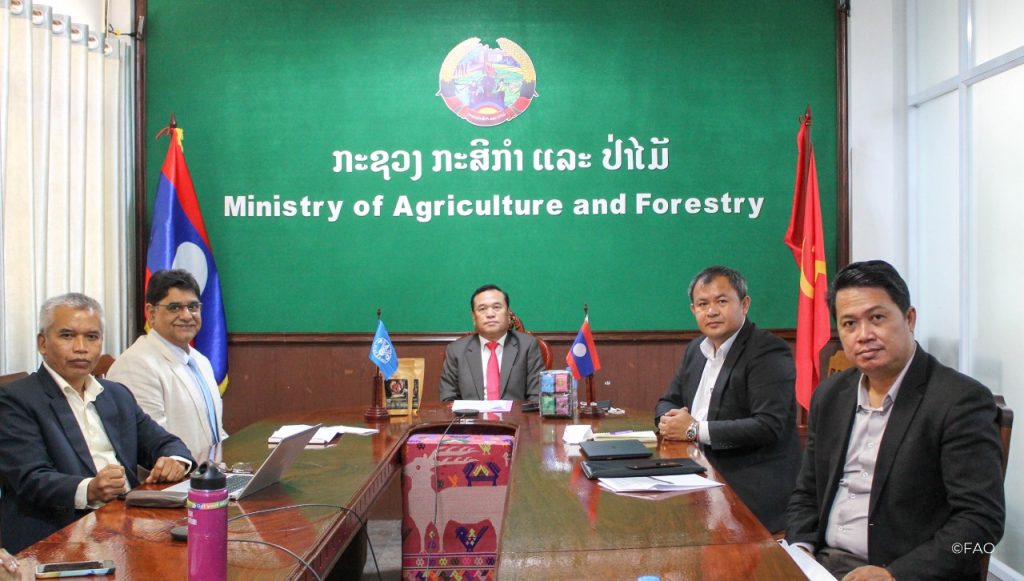
ນະຄອນຫຼວງວຽງຈັນ, ສປປ ລາວ, ວັນທີ 10 ພຶດສະພາ 2022, ອົງການອາຫານ ແລະ ການກະເສດ ແຫ່ງ ສະຫະປະຊາຊາດ (FAO) ໄດ້ເປີດຕົວຢ່າງເປັນທາງການ ວ່າດ້ວຍການຈັດຕັ້ງປະຕິບັດ ການພັດທະນາສີຂຽວ ຂອງການຜະລິດຕະພັນກະສິກຳແບບພິເສດ ໃນທົ່ວໂລກ: “ໜຶ່ງປະເທດ-ໜຶ່ງບຸລິມະສິດ ຜະລິດຕະພັນ” ໃນການຈັດຕັ້ງປະຕິບັດຂອງຂອບເຂດທົ່ວປະເທດໃນພາກພື້ນອາຊີ ແລະ ປາຊີ ຟິກ. ກອງປະຊຸມລະບົບອອນໄລດັ່ງກ່າວໄດ້ຮັບຄວາມສົນໃຈຈາກລັດຖະມົນຕີກະຊວງ ກະສິກຳ ແລະ ປ່າໄມ້ ຈາກພາກພື້ນອາຊີ ແລະ ປາຊີຟິກ ຄື: ປະເທດ ບູຕານ, ອິນໂດເນເຊຍ, ຊາມົວ, ເກາະໂຊໂລມອນ, ໄທ, ຈີນ ແລະ ສປປ ລາວ.
ການລິເລີ່ມ “ໜຶ່ງປະເທດ–ໜຶ່ງບຸລິມະສິດຜະລິດຕະພັນ” (OCOP) ໄດ້ຮັບການສ້າງຕັ້ງຂຶ້ນ ໂດຍອີງໃສ່ບັນດາຫຼັກການຊີ້ນຳທີ່ລະບຸໄວ້ພາຍໃຕ້ຂອບຍຸດທະສາດ FAO ສຳລັບປີ 2022-2031, ໂດຍໄດ້ຮັບຮອງຈາກກອງປະຊຸມ FAO ຄັ້ງທີ 42 ໃນເດືອນ ມິຖຸນາ 2021. ການປ່ຽນແປງໄປສູ່ລະບົບອາຫານກະສິກຳທີ່ມີປະສິດທິພາບ, ທີ່ເປັນເອກະພາບກັນ, ມີຄວາມຢືດຢຸ່ນ ແລະ ຄວາມຍືນຍົງໃຫ້ແກ່ການຜະລິດທີ່ດີຂຶ້ນ, ໂພຊະນາການທີ່ດີຂຶ້ນ, ສິ່ງແວດລ້ອມທີ່ດີຂຶ້ນ ແລະ ຊີວິດທີ່ດີຂຶ້ນໂດຍບໍ່ຖິ້ມໃຜໄວ້ທາງຫຼັງ.
OCOP ໄດ້ຮັບການອອກແບບມາ ເພື່ອສະໜັບສະໜູນບັນດາປະເທດສະມາຊິກ ໃນການຜະລິດຫຼາຍຂຶ້ນ ໃຊ້ວິທີແກ້ໄຂບັນຫາ ດ້ວຍນະວັດຕະກໍາ, ອີງໃສ່ຫຼັກຖານ ແລະ ວິທີການ, ໂດຍພິຈາລະນາລະດັບການເຊື່ອມໂຍງທາງດ້ານເສດຖະກິດ, ສັງຄົມ ແລະ ສິ່ງແວດ ລ້ອມຂອງລະບົບອາຫານທາງກະສິກຳ. ໂດຍການສົ່ງເສີມລະບົບສະບຽງອາຫານທີ່ຄວບຄຸມ, ເຮັດໃຫ້ມີຜົນກຳໄລ ແລະ ດ້ານສິ່ງແວດ ລ້ອມໃຫ້ມີຄວາມຍືນຍົງ ໂດຍຜ່ານການຜະລິດ, ການເກັບຮັກສາ, ການປຸງແຕ່ງ ແລະ ຕະຫຼາດສີຂຽວ. OCOP ຈະແກ້ໄຂ 5 ສິ່ງທ້າທາຍອັນສຳຄັນຂອງໂລກ ເຊັ່ນ: (1) ການເພີ່ມຜົນຜະລິດ ແລະ ການຮັບປະກັນອາຫານເພື່ອສຸຂະພາບ; (2) ຫຼຸດຜ່ອນການເສຍຫາຍຂອງອາຫານ ແລະ ສິ່ງເສດເຫຼືອ ແລະ ປົກປັກຮັກສາຊີວະນາໆພັນ; (3) ການປະຢັດນ້ຳ ແລະ ການນຳໃຊ້ທີ່ດິນໃຫ້ເກີດປະໂຫຍດສູງສຸດ; (4) ຫຼຸດຜ່ອນການນໍາເຂົ້າສານເຄມີທາງກະສິກໍາ ແລະ (5) ຫຼຸດຜ່ອນ ແລະ ການປັບຕົວເຂົ້າກັບການປ່ຽນແປງດິນຟ້າອາກາດ.
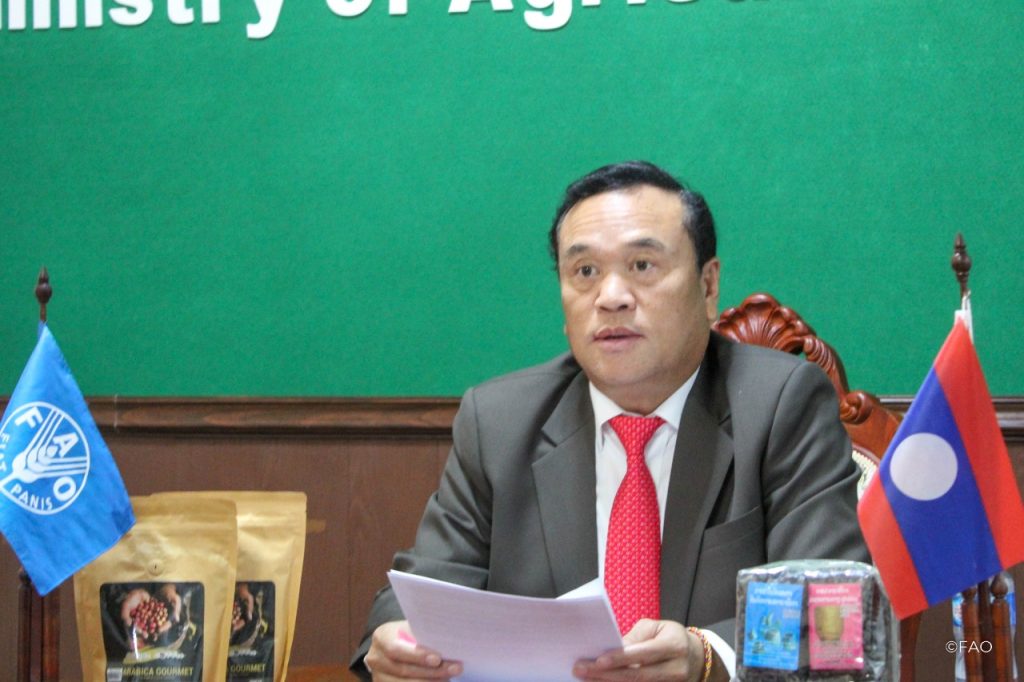
ທ່ານ ທອງພັດ ວົງມະນີ ຮອງລັດຖະມົນຕີກະຊວງກະສິກຳ ແລະ ປ່າໄມ້, ສປປ ລາວ ໄດ້ຮັບຮູ້ເຖິງຜົນປະໂຫຍດທີ່ຈະເກີດຂຶ້ນຈາກການລິເລີ່ມ OCOP. ທ່ານໄດ້ກ່າວວ່າ: “ເປັນຮູບແບບທີ່ມີປະໂຫຍດຫຼາຍ ສໍາລັບການສຳຫລວດ ແລະ ແບ່ງປັນແນວຄວາມຄິດ ແລະ ປະສົບການຂອງພວກເຮົາ. ເຖິງຢ່າງໃດກໍຕາມ, ຊຸກຍູ້ສົ່ງເສີມຄວາມເປັນເຈົ້າຂອງປະເທດ, ເພີ່ມທະວີການຮ່ວມມື ແລະ ເປັນການແລກປ່ຽນຄວາມຮູ້ທາງຊ່ຽວຊານດ້ານວິຊາການ ລະຫວ່າງບັນດາປະເທດສະມາຊິກໃນພາກພື້ນ”. ທ່ານກ່າວຕື່ມວ່າ: “OCOP ຍັງຈະຊ່ວຍສະໜັບສະໜູນ ໃນການເຂົ້າເຖິງຂໍ້ມູນຂ່າວສານທາງການຕະຫຼາດ, ເຕັກໂນໂລຊີການຜະລິດ ແລະ ນຳໃຊ້ນະວັດຕະກຳກະສິກຳເຂົ້າໃນທຸລະກິດຂອງເຂົາເຈົ້າ”.
ພາຍໃຕ້ໂຄງສ້າງ ຂອງ OCOP, ຈະມີການແນະນຳຜະລິດຕະພັນກະສິກໍາແບບພິເສດ (SAPs) ເປັນຜະລິດຕະພັນກະສິກໍາທີ່ມີຄຸນນະສົມບັດທີ່ເປັນເອກະລັກ ແລະ ລັກສະນະພິເສດ ທີ່ກ່ຽວຂ້ອງກັບທີ່ຕັ້ງພູມສາດ, ການຈັດຕັ້ງປະຕິບັດກະສິກໍາ ແລະ ມໍລະດົກທາງວັດທະນະທໍາ. ສິ່ງເຫຼົ່ານີ້ເປັນຕົວຢ່າງທີ່ສຳຄັນຂອງຊັບພະຍາກອນ ທີ່ຂາດການນຳໃຊ້ໜ້ອຍທີ່ສຸດ, ທີ່ໄດ້ຮັບຄວາມສົນໃຈຄືກັນກັບຜະລິດຕະພັນທາງກະສິກຳທີ່ຮູ້ຈັກກັນແບບທົ່ວໄປ, ແຕ່ສາມາດປະກອບສ່ວນອັນສຳຄັນເຂົ້າໃນການຮັບປະກັນຄວາມໝັ້ນຄົງ ທາງດ້ານສະບຽງອາ ຫານ ແລະ ອາຫານທີ່ມີສຸຂະພາບ, ສະໜັບສະໜູນເສດຖະກິດຊີວະພາບທີ່ຍືນຍົງ ແລະ ປັບປຸງຊີວິດການເປັນຢູ່ຂອງຊາວກະສິກອນ ແລະ ການເຕີບໂຕທາງດ້ານເສດຖະກິດ, ພ້ອມທັງປົກປັກຮັກສາສິ່ງແວດລ້ອມ ແລະ ຊີວະນາໆພັນ. SAPs ປະກອບມີຜະລິດຕະພັນກະສິກໍາທຸກປະເພດ, ມີທ່າແຮງທີ່ຈະກາຍເປັນຜະລິດຕະພັນກະສິກໍາລະດັບປະເທດ ຫຼື ທ້ອງຖິ່ນ ແລະ ປະສົມປະສານໃຫ້ເຂົ້າໄປໃນຕະຫຼາດທ້ອງຖິ່ນ, ພາກພື້ນ ແລະ ທົ່ວໂລກ.
ຄວາມຄາດຫວັງຂອງ OCOP ລວມມີ: (1) ສ້າງຕັ້ງເຄືອຂ່າຍເຕັກນິກສຳລັບນະວັດຕະກຳ ແລະ ການຫັນປ່ຽນການພັດທະນາສີຂຽວຂອງ SAPs ດ້ວຍ 3-5 ບ່ອນທົດລອງ; (2) ເຜີຍແຜ່ຮູບແບບຂອງນະວັດຕະກໍາ ແລະ ຮູບແບບທາງເຕັກນິກສໍາລັບການພັດທະນາສີຂຽວຂອງ SAPs; (3) ການພັດທະນາຮູບແບບຂອງນະໂຍບາຍເພື່ອການພັດທະນາແບບຍືນຍົງຂອງ SAPs; (4) ກຳນົດຮູບແບບການເຂົ້າເຖິງຕະຫຼາດທີ່ມີປະສິດທິພາບເພື່ອການພັດທະນາແບບຍືນຍົງຂອງ SAPs ແລະ (5) ສ້າງຕັ້ງກົນໄກການປະສານງານທີ່ມີປະສິດ ທິພາບ ເພື່ອການພັດທະນາສີຂຽວຂອງ SAPs ໃນທົ່ວປະເທດ.

ທ່ານ Nasar Hayat ຜູ້ຕາງໜ້າອົງການ FAO ປະຈຳ ສປປ ລາວ ໃຫ້ຮູ້ວ່າ: ລະບົບການຜະລິດກະສິກຳມີບົດບາດສຳຄັນໃນການຕອບສະໜອງຄວາມຕ້ອງການອາຫານ, ອາຫານເສັ້ນໄຍທີ່ເພີ່ມຂຶ້ນ ແລະ ປະກອບສ່ວນເຂົ້າໃນເປົ້າໝາຍການພັດທະນາແບບຍືນຍົງຕ່າງໆ, ໂດຍສະເພາະ SDG 1 (ລົບລ້າງຄວາມທຸກຍາກ), SDG 2 (ລົບລ້າງໄພອືດຫິວ) ແລະ SDG 10 (ການຫຼຸດຜ່ອນຄວາມບໍ່ສະ ເໝີພາບ). ທ່ານ Nasar Hayat ຍັງເນັ້ນໜັກວ່າ: FAO ເຊື່ອໝັ້ນວ່າ ດ້ວຍການເພີ່ມທະວີການຮ່ວມມື ແລະ ການຮ່ວມມືລະຫວ່າງບັນດາປະເທດສະມາຊິກໃນພາກພື້ນ, ພວກເຮົາສາມາດບັນລຸການຟື້ນຟູແບບມີໂຄງສ້າງແບບຍືນຍົງ, ໂດຍສະເພາະແມ່ນຜົນສະທ້ອນມາຈາກການລະບາດພະຍາດໂຄວິດ-19. ພວກເຮົາຈະຢືນຢັນໃນການສະຫນັບສະຫນູນປະເທດສະມາຊິກ ເພື່ອຮັບປະກັນຄວາມປອດໄພດ້ານສະບຽງອາຫານເພື່ອທຸກຄົນ.
ໃນກອງປະຊຸມ, ໄດ້ສະເໜີໃຫ້ກາເຟລາວເຂົ້າໃນການລິເລີ່ມ OCOP. ນອກຈາກຄຸນລັກສະນະທາງພູມສາດແລ້ວ, ກາເຟຍັງມີທ່າແຮງທີ່ຈະຫັນປ່ຽນຊີວິດການເປັນຢູ່ຂອງຄອບຄົວທຸກຍາກເປັນຈຳນວນຫຼວງຫຼາຍ ແລະ ຜົນປະໂຫຍດຈະຂະຫຍາຍໄປສູ່ຂະແໜງ ການອື່ນໆເຊັ່ນ: ສາທາລະນະສຸກ, ໂພຊະນາການ ແລະ ການສຶກສາ.
Vientiane, Lao PDR – On May 10, 2022, The Food and Agriculture Organization of the United Nations (FAO) officially launched today the Global Action on Green Development of Special Agricultural Products: “One Country – One Priority Product” to be implemented across the region of Asia and the Pacific. The virtual meeting received great attention from ministers of agriculture and forestry from Asia and the Pacific, namely Bhutan, Indonesia, Samoa, Solomon Island, Thailand, China and Lao PDR.
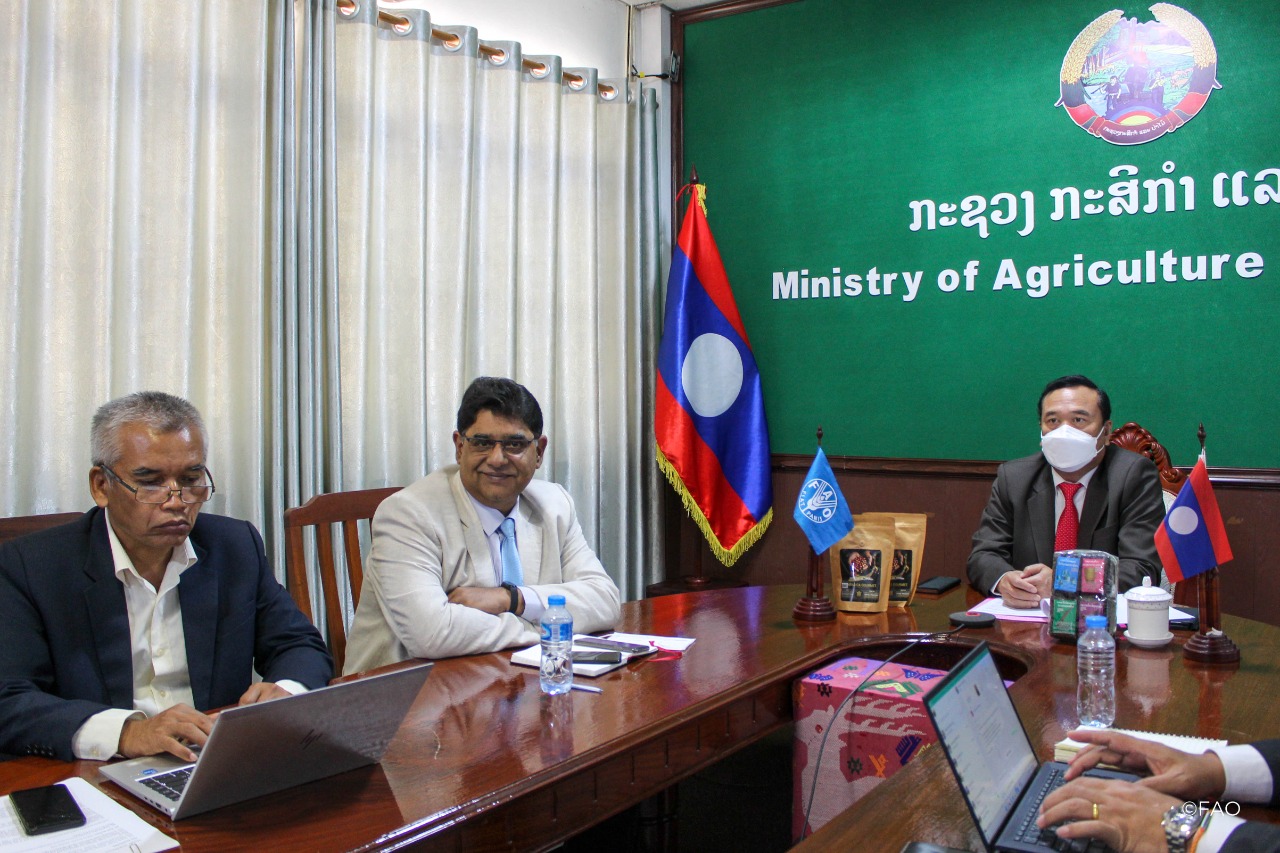
The initiative on “One Country – One Priority Product” (OCOP) has been formulated under the key guiding principles specified under the FAO Strategic Framework for 2022–2031, endorsed by the 42nd Session of FAO Conference in June 2021. This framework focuses on supporting the transformation to more efficient, inclusive, resilient and sustainable agri-food systems for better production, better nutrition, better environment and better life, leaving no one behind.
The OCOP is designed to support Member Countries to produce more with less through innovative, evidence-based solutions and sustainable approaches, by considering the interlinked economic, social, and environmental dimensions of agri-food systems. By promoting inclusive, profitable, and environmentally sustainable food systems through the green production, storage, processing, and marketing, the OCOP will address five major global challenges, including (1) increasing productivity and ensuring healthy diets; (2) reducing food loss and waste, and protecting biodiversity; (3) saving water and optimizing land uses; (4) minimizing agricultural chemical inputs; and (5) mitigating and adapting to climate change.
H.E. Thangphat Vongmany, Deputy Minister of Agriculture and Forestry of Lao PDR, acknowledged the potential benefits derived from the OCOP initiative. He stated that “it provides a very useful platform for exploring and sharing our ideas and experiences. Yet, it encourages country ownership, strengthen collaboration and establish sharing of technical expertise among Member Countries in the region”. “The OCOP will also support practitioners in the countries to access market information, production technology and apply agricultural innovation in their businesses”, he added.
Under the OCOP’s structure, Special Agricultural Products (SAPs) will be introduced. They are agricultural products with unique qualities and special characteristics associated with geographical locations, farming practices and cultural heritages. They are important examples of underutilized resources which have not received the same attention as commonly known agricultural products, but which can significantly contribute to ensuring food security and healthy diets, supporting a sustainable bioeconomy and improving farmers’ livelihoods and economic growth, while protecting the environment and biodiversity. SAPs include all kinds of agricultural products, with the potential to become national or local agricultural products, and to be integrated into local, regional, and global markets and trade.
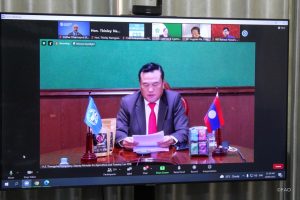
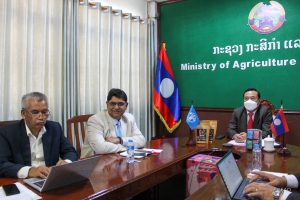
Expected Outputs of the OCOP include: (1) establishing Technical networks for innovation and transformation of green development of SAPs with 3-5 pilot sites; (2) disseminating a series of innovative and technical packages for green development of SAPs; (3) developing a set of policy enablers for sustainable development of SAPs; (4) formulating an effective market access platform for sustainable development of SAPs; and (5) setting up an efficient coordination mechanism for green development of SAPs nationwide.
Mr. Hayat Nasar, FAO Representative to Lao PDR, noted that agricultural production systems play an important role in meeting the rising demands for food, feed, fibre and contribute to various Sustainable Development Goals, particularly SDG 1 (No poverty), SDG 2 (Zero hunger) and SDG 10 (Reduced inequalities). Mr. Hayat Nasar also emphasized that FAO strongly believes that with increased cooperation and collaboration among Member Countries in the region, we can achieve structured and sustainable recovery, especially as a result of the COVID-19 pandemic. We will stand committed in supporting the Member Countries to ensure food security for all.
During the meeting, Lao coffee was proposed to be included in the OCOP initiative. Apart from the geographic characteristics, the coffee has the potential to transform the livelihood of a large number of poor households and the benefits will spin off to other sectors such as health, nutrition and education.
Lao Media Contact Person/s:
Bounmee Maokhamphiou, Outreach Specialist – Bounmee.Maokhamphiou@fao.org
Vilaylack Khounvisith, National Communication Consultant – Vilaylack.Khounvisith@fao.org
